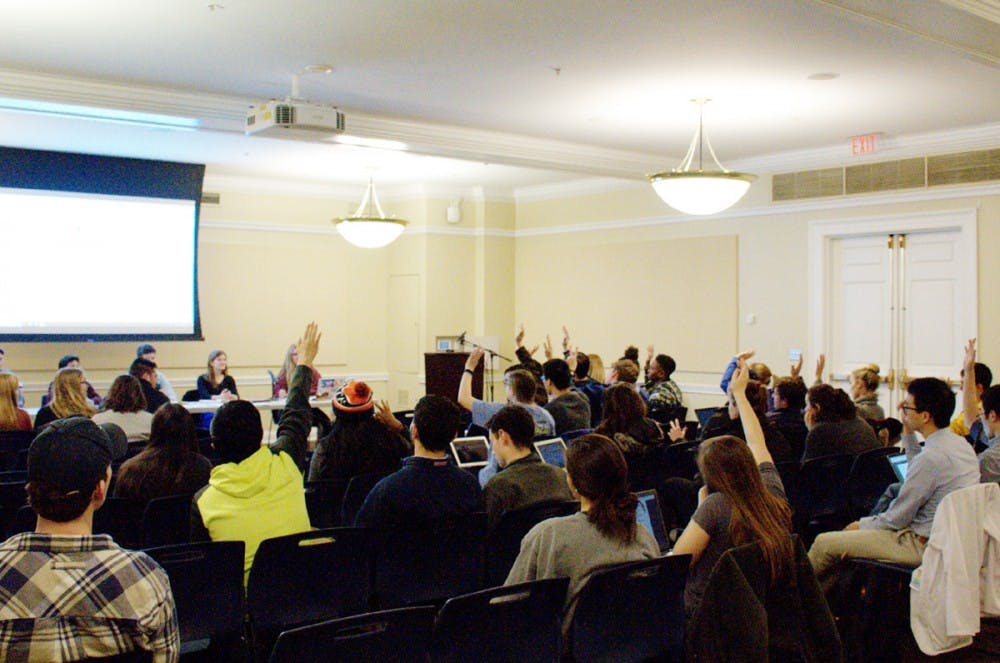With the brouhaha of elections finally upon us, we have begun to see the same tired monologues stressing the importance of Student Council and imploring increased turnout — which in recent elections hovered around 20 percent of the populace. However, contrary to what many of our peers would have us believe, the Council does not have the power to legislate any degree of meaningful change in our lives — nor should they. In truth, the Council is little more than a glorified bookkeeping club — which isn’t necessarily a bad thing — but without any tangible authority whatsoever, there is no reason for the average student to be concerned with the outcome of these races.
An examination of Article 1, Section 3 of the Student Council Constitution reveals the impetus of my claim. This brief passage communicates the organization’s derivation of power and authority, or rather, the lack thereof. Unlike a legitimate governing body, Council lacks any formal sovereignty other than recognition by “University Administrators” — which is a purely vacuous statute. Hence, I would assert that the oft-quoted phrase “student self-governance” is a misconstruction. The extent of their power is essentially lobbying the Board of Visitors and administration, except without the leverage of financial incentives. This is evidenced by their “legislation,” which is little more than an amalgamation of meaningless resolutions and bureaucratic, internal adjustments.
Despite this obvious lack of authority though, one would hope that the Council would at the very least put their limited power to use and bring to light important problems in the community. However, this is very much not the case as they instead choose to devote their resources to a mix of inane quarrels and hopeless endeavors — such as attempting to remove vital dissections from biology classes or aimlessly “resolving” in support of carbon neutrality.
That being said, their ineptitude is not constrained only to matters of policy, but also community outreach and interaction. The Council’s website is a neglected, unkempt nightmare that looks as if it were constructed in the late Mesozoic era. For instance, the most recent statement on the “News” page dates back to October, 2017, and the only opportunity mentioned on the “Get Involved” page dates back to August of the same year. That is without mentioning their desolate Twitter page which averages about a post per month and hasn’t been used since the semester started. However, in all fairness, their Facebook page doesn’t seem to be as dreadfully managed as the rest of their communications.
Lost in this discussion of the Council’s authority, though, is the question of whether or not a student-run organization should have any sort of substantial power. It is my belief that the vast majority of students simply see college as a means of advancing their life goals, and most do not want to embroil themselves in petty politics. Giving an almost entirely homogeneous, populist group of students considerable power over the lives of the University community would just end up causing undue stress. This is amplified by the fact that there are no real requirements to run for office, such as proof of academic merit or industrial qualifications, meaning that literally any student can compete for a position given enough popularity — or money.
However, despite all of my criticisms and scrutiny, the Council does in fact serve at least one indispensable purpose on Grounds — distribution of funding. Each school year they are given a substantial cash grant, primarily from the Board of Visitors, which they can allocate to student organizations and any causes that they see fit. The hefty $72,000 lump sum from this past year’s budget went to a number of worthy causes — such as Sustainability and Safety & Wellness — which do in fact substantially ameliorate the lives of students on Grounds. Thus, I believe it is fair to refer to them as a glorified organization of bookkeepers — a financial discipline involving the recording and maintenance of transactions.
Bluntly put, if our Student Council cannot give the populace a meaningful reason to cast a vote, then they should not expect us to do so. The organization is not entirely without merit, but the fanfare and self-aggrandizement that takes place during this time of year is nauseating when you consider their diminutive stature. The Council should focus on improving their communications and diverting their attention towards meaningful actions they can take, such as fundraising for Contracted Independent Organizations on Grounds or local charities — as they have done in the past. They are nothing more than a virtually powerless, University sanctioned student group and until they acknowledge themselves as such and embrace that role, they will receive nothing but apathy from the populace.
Milan Bharadwaj is an Opinion Columnist for The Cavalier Daily. He can be reached at opinion@cavalierdaily.com.







